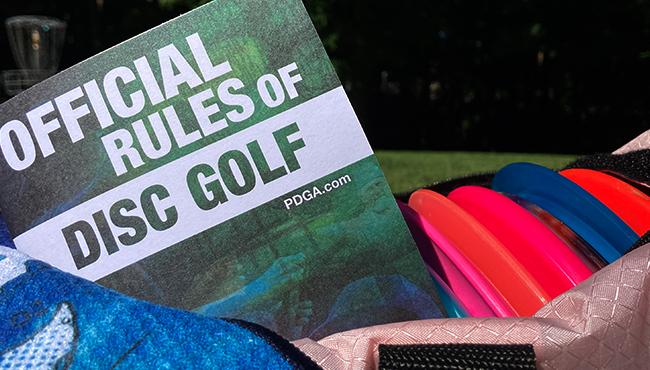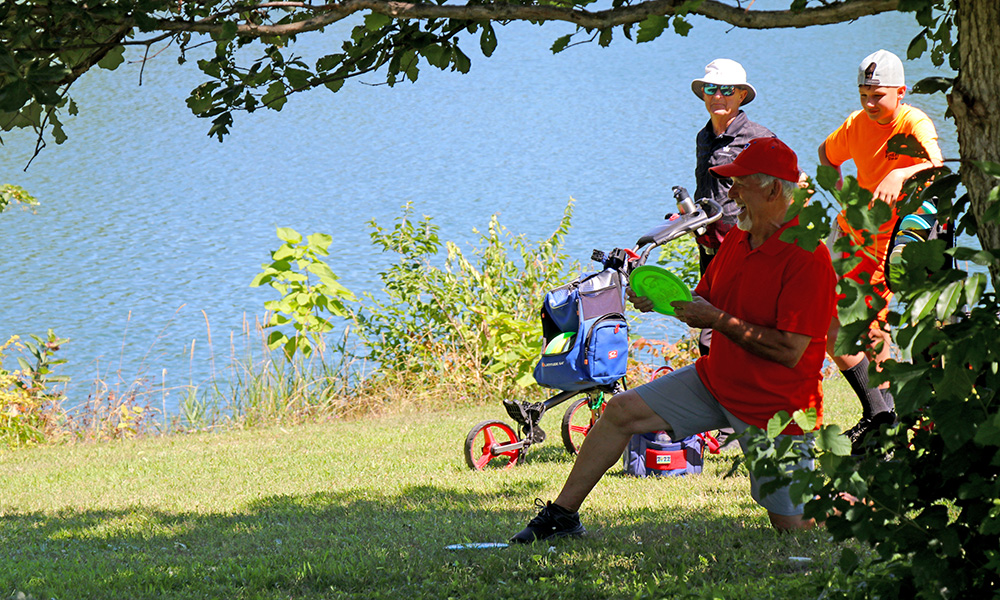Learn to Play - for Seniors

If you are just starting or have never played disc golf but want to learn, here are a few suggestions. Start with the Introduction to Disc Golf. Then check-out the History of Disc Golf. Another great reference for learning more about disc golf can be found from DGA.
Where to Play
The first step is to find a course near you. You can locate courses on-line at the PDGA's course directory, Disc Golf Scene, the UDisc site, Disc Golf Course Review. Those sites also have links to local disc golf club’s websites. You can go there to see what is going on in your area or to find a local contact to learn more. If possible, start out on easier courses that aren’t as long or offer multiple tee options, and those that don’t have a lot of trees or water hazards.
Rules
A simplified, beginner’s rules can be found on the DGA website. This is what you need to start playing. If you decide you want to play competitively, you will need to learn the complete set of PDGA rules.

Discs
The next step is to get some disc(s). You can just use a regular frisbee or an ultimate disc if you just want to play for fun. You only need one disc to play, but just like in regular golf, there are different discs for different situations. If you want to get better, you will want a driver for distance, a mid-range for getting close, and a putter to finish. If you want to play competitively or want to improve your game, you will need ‘PDGA’ approved golf discs. There are thousands of approved discs and scores of different manufacturers. The best way to start is to purchase a manufacturer’s starter set which will typically include a putter, a mid-range (iron), and a fairway driver (3 wood). Once you learn to throw those, you can start to graduate to other discs. You will probably be able to throw your putter or mid-range further than your driver at first, but that should change as your disc golf skills develop.
There are a number of on-line sites where you can buy discs if you do an on-line search. Some areas have local retail disc golf sales options. Some major retailers and sporting good chains will offer a limited number of golf discs depending on the demand locally.
There are numbers on most discs that tell you the speed, fade, glide and stability factor of each disc. Senior players will want to start out and stay with lighter weight, slower speed, more stable discs and work up from there. The softer, grippier, less expensive plastic is usually better when you start. The same weight and type of disc from a different type of plastic can fly totally different.
Instructions
Try to learn the correct way to throw before you start so you don’t develop bad habits right away. This is not like throwing a frisbee where you stand still and throw it by snapping your wrist. If your local club hosts disc golf clinic, that is the best way to start. The next best way would be to find a good disc golfer that would be willing to help you.
If that is not an option, there are plenty of videos on-line that you can watch to learn the proper technique. There are beginner instructional videos on DGA's website. Seniors should be mindful that if they are learning from a younger disc golfer or video, that they will probably not be able to throw as far or accurately as the experienced player that is teaching you. Set your expectations appropriately and realize it will take time to develop your game. Don’t’ be too frustrated at first. If you are a ball golfer, remember how long it took you to learn that.
There are different ways of throwing a disc. There are the backhand, sidearm, tomahawk, and rollers. Try to learn the backhand first and work into the others as you develop your game. At some point, you may realize you are a better side-armer.
Each throwing style requires a different grip, approach (standing or run-up), backswing, snap / release, and follow-through. By changing your release angle, you control the direction the disc will travel. You will eventually learn all of that.
Tips for Improving your Game
Take time to practice. Don’t always go to a course and play. Go to a field and just practice driving and approach shots. Find a practice basket and just practice putting.
Find other players to play with so you can learn from them. Most players are glad to be able to help them learn.
Once you have a little feel for throwing, consider joining a local disc golf league or scramble. Many clubs host weekly random draw scrambles where they pair an ‘A’ player with a ‘B’ player and play best shot doubles. You will get to play with better players and learn from them.
Be patient and don’t get too frustrated too soon. Some players might catch on to it in a month, other might take a year, but usually at some point something will just click and you will have that ‘ahh haw’ moment.
Play on a regular basis while you are learning. It is like anything else, you need consistent practice to improve or maintain your game.
HAVE FUN!!! This is a game. Do not take it so seriously. If it’s not fun you are not doing right.

